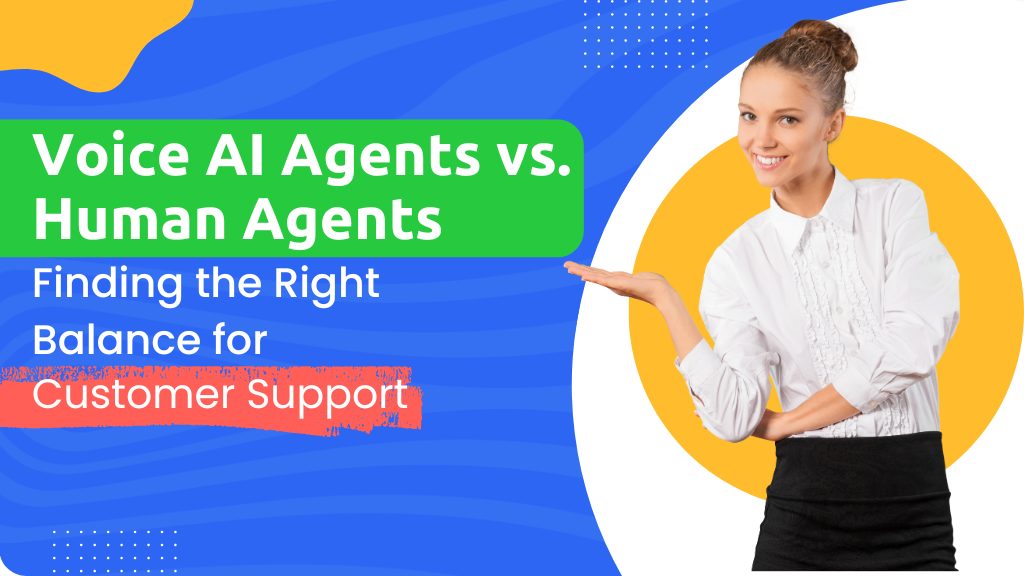
In today’s rapidly evolving technological landscape, the integration of artificial intelligence (AI) in various sectors is transforming traditional processes. One area experiencing significant transformation is customer support, where voice AI agents are being increasingly adopted. These advanced systems are designed to handle a wide range of customer interactions, offering potential benefits such as increased efficiency and cost savings.
However, despite these advantages, there remains a critical question:
Can voice AI agents truly replace human agents, or is there a need for a balanced approach?
This article explores the roles of voice AI agents and human agents in customer support, examining their respective strengths and limitations to identify the optimal balance for delivering exceptional customer service.
The Rise of Voice AI Agents in Customer Support
Voice AI agents are sophisticated systems powered by machine learning algorithms and natural language processing (NLP). They are designed to understand and respond to human speech in real time, making them ideal for various customer support functions. The development of voice AI technology has been driven by advancements in AI, NLP, and cloud computing, enabling these systems to handle complex queries and provide accurate, context-aware responses.
Advantages of Voice AI Agents

- 24/7 Availability: One of the most significant advantages of voice AI agents is their ability to operate around the clock. Unlike human agents, AI systems do not require breaks or sleep, ensuring that customers can receive support at any time of day or night. This continuous availability can significantly enhance customer satisfaction and loyalty.
- Cost Efficiency: Implementing voice AI agents can lead to substantial cost savings for businesses. AI systems can handle a high volume of interactions simultaneously, reducing the need for a large customer support team. This scalability allows companies to manage peak periods without incurring additional labor costs.
- Consistency: Voice AI agents provide consistent responses, ensuring that all customers receive the same level of service. This uniformity can help maintain brand reputation and reduce the risk of human error, which can occur with human agents due to fatigue or misunderstanding.
- Data Collection and Analysis: AI systems can collect and analyze vast amounts of data from customer interactions, providing valuable insights into customer behavior and preferences. This data can be used to improve products, services, and overall customer experience.
- Handling Routine Queries: Voice AI agents excel at managing routine and repetitive queries, freeing up human agents to focus on more complex and sensitive issues. This division of labor can enhance the efficiency and effectiveness of the customer support team.
Limitations of Voice AI Agents
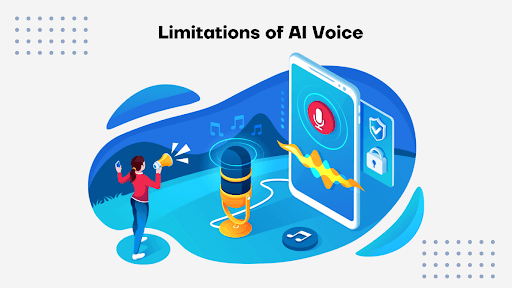
- Lack of Empathy: Despite their advanced capabilities, voice AI agents cannot replicate the empathy and emotional intelligence that human agents bring to customer interactions. This limitation can be a significant drawback in situations that require a compassionate response, such as handling complaints or dealing with distressed customers.
- Complex Problem-Solving: While AI systems are excellent at managing routine queries, they may struggle with more complex issues that require nuanced understanding and problem-solving skills. In such cases, human agents are better equipped to provide personalized solutions.
- Cultural Sensitivity and Language Nuances: Voice AI agents may not fully understand cultural contexts, idiomatic expressions, or regional accents, potentially leading to misunderstandings or inappropriate responses. Human agents, with their cultural awareness and language proficiency, can navigate these nuances more effectively.
- Technical Limitations: Although voice AI technology has advanced significantly, it is not infallible. Issues such as background noise, poor audio quality, or technical glitches can hinder the performance of AI agents, affecting the quality of customer support.
Human agents have long been the cornerstone of customer support, offering personalized assistance
Role of Human Agents in Customer Support
Human agents have long been the cornerstone of customer support, offering personalized assistance and building rapport with customers. Despite the rise of voice AI agents, human agents continue to play a crucial role in delivering exceptional customer service.
Advantages of Human Agents
- Empathy and Emotional Intelligence: Human agents possess the ability to empathize with customers, understand their emotions, and responding appropriately. This emotional intelligence is particularly valuable in handling sensitive issues, resolving conflicts, and providing reassurance to customers.
- Complex Problem-Solving: Human agents excel at addressing complex and unique issues that require critical thinking and creativity. Their ability to analyze situations, consider multiple perspectives, and develop tailored solutions is a key advantage over AI systems.
- Building Customer Relationships: Human agents can establish a personal connection with customers, fostering trust and loyalty. By engaging in meaningful conversations and demonstrating genuine concern for customer needs, human agents can enhance the overall customer experience.
- Adaptability: Human agents can quickly adapt to changing situations, handling unexpected queries or issues with flexibility. Their ability to think on their feet and adjust their approach based on the context is a significant asset in dynamic customer support environments.
Limitations of Human Agents
- Limited Availability: Unlike AI systems, human agents require breaks, rest, and time off, limiting their availability for customer support. This constraint can lead to longer wait times and reduced accessibility for customers seeking assistance outside regular business hours.
- Inconsistency: Human agents may provide inconsistent responses due to factors such as fatigue, stress, or lack of knowledge. This variability can affect the quality of customer support and impact customer satisfaction.
- Higher Costs: Employing a large team of human agents can be costly, particularly for businesses with high customer support demands. Labor costs, including salaries, benefits, and training, can add up, making it challenging to scale customer support operations efficiently.
- Data Collection and Analysis: While human agents can gather qualitative insights from customer interactions, they may lack the ability to systematically collect and analyze large volumes of data. AI systems, with their advanced analytics capabilities, can provide more comprehensive and actionable insights.
Striking the Right Balance: Integrating Voice AI Agents and Human Agents
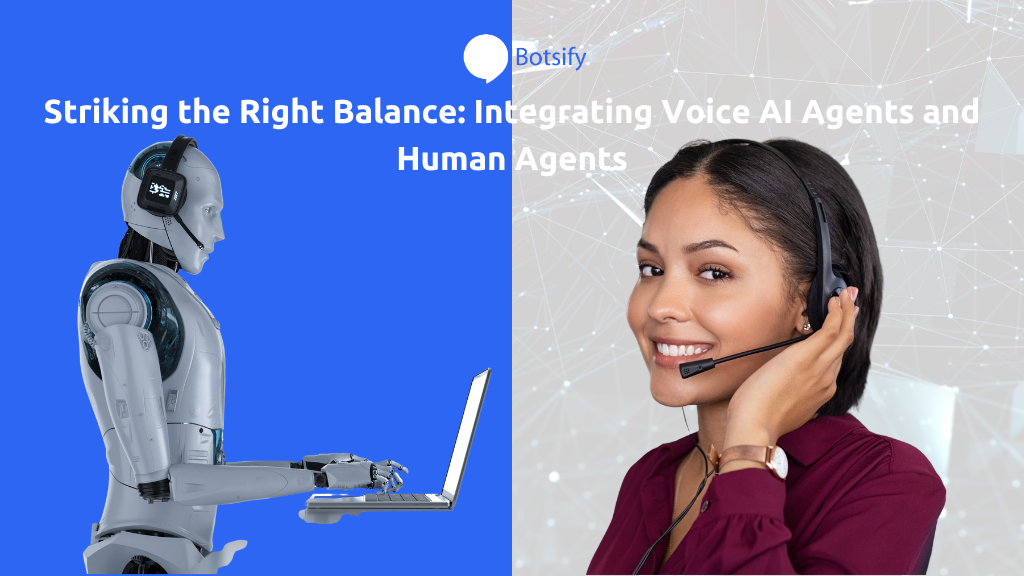
Given the respective strengths and limitations of voice AI agents and human agents, finding the right balance between the two is essential for delivering exceptional customer support.
Implementing multi agent hyperautomation can help organizations coordinate different AI components to optimize workflows without compromising human oversight.
A hybrid approach that leverages the capabilities of both AI and human agents can optimize the customer support experience.
Generate More Leads With Voice AI agents
Gather quality leads on autopilot and 10x your ROI with automated calls
Best Practices for Integrating Voice AI and Human Agents
- Define Clear Roles and Responsibilities: Establish clear guidelines for when and how voice AI agents and human agents should be utilized. AI agents can handle routine queries, while human agents can focus on complex and emotionally charged interactions. This division of labor ensures that customers receive timely and appropriate support.
- Seamless Handover Process: Implement a seamless handover process to transfer interactions from AI agents to human agents when necessary. Ensure that AI agents can recognize when a query is beyond their capabilities and escalate it to a human agent promptly. This transition should be smooth and transparent to the customer.
- Continuous Training and Improvement: Regularly update and train AI agents to improve their performance and accuracy. Similarly, provide ongoing training for human agents to enhance their skills and knowledge. Encourage collaboration between AI and human agents to share insights and learn from each other.
- Leverage Data and Analytics: Utilize the data collected by AI agents to gain insights into customer behavior and preferences. Use this information to inform decision-making and improve the overall customer support strategy. Human agents can also provide qualitative feedback to refine AI algorithms and enhance their performance.
- Personalization and Human Touch: While AI agents can handle routine queries, human agents should focus on providing personalized support and building relationships with customers. Use AI to gather relevant information and context before transferring interactions to human agents, enabling them to deliver more personalized and empathetic support.
- Monitor and Evaluate Performance: Regularly monitor the performance of both AI and human agents to identify areas for improvement. Use key performance indicators (KPIs) such as response times, resolution rates, and customer satisfaction scores to assess the effectiveness of the hybrid approach.
Tools for Integrating Voice AI Agents
Several tools and platforms have been developed to facilitate the integration of voice AI agents in customer support. Here are 6 notable examples:
1. Botsify Voice AI
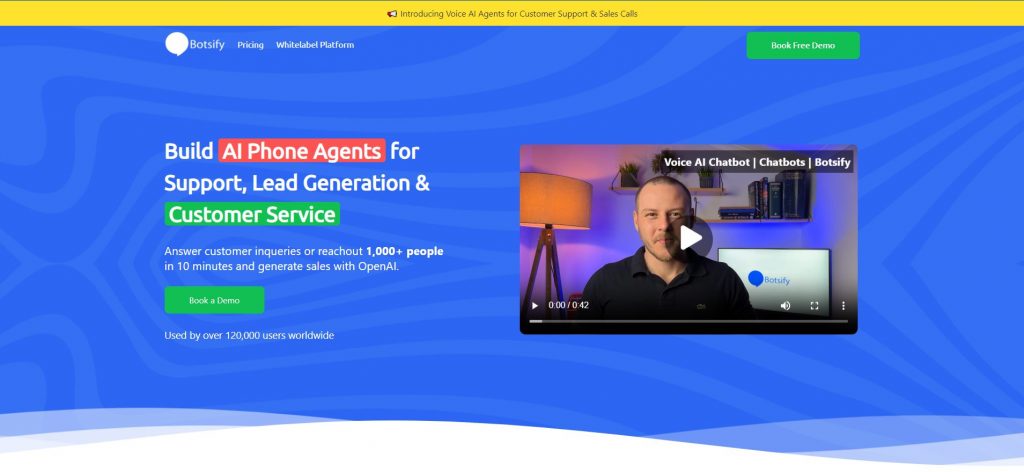
Botsify is an AI chatbot platform that recently launched a new feature called Voice AI agents. Botsify voice agents are fully loaded conversational agents to solve different business use cases. Sky’s the limit, if you call someone you can use our agents. Checkout cases and call recordings on the website come up with 4 different scales sales outreach, customer support, reception assistant, and order confirmation and callbacks.
- Sales outreach
Initiate outreach by calling multiple targeted prospects simultaneously, starting with introductions and needs confirmation. Utilize automated objection handling and real human voices to enhance engagement. Finally, arrange appointments and schedule follow-up calls with interested prospects. Our system covers it all:
– Automated objection handling
– Forwarding calls to human agents
– Booking appointments on calendars
- Customer support
Do you sell a product and want to offer high-quality, 24/7 support? No need for complex infrastructure setups. Our agents can handle multiple calls simultaneously and provide up to 80% automated responses for common customer issues and questions.
– Automatically replying to frequent questions
– 24/7 availability
– Cloning your own voices
- Reception assistant
Are your business calls handled by a receptionist? They likely spend most of their time managing calls instead of assisting onsite customers. Even if not, call handling significantly reduces their productivity and affects their other responsibilities.
– Automatically replying to frequent questions
– Forwarding only important calls
– Cloning your receptionist’s voice
- Order confirmation
Do you call your customers for specific events, such as new bookings or orders? Do you want to prevent fraud in your systems? Automated AI callbacks for data collection and confirmation are the solution of the future.
– Automated calls using API
– Collecting data or confirmation
– Triggering actions or API upon confirmation
Basic Plan: $27/Mon, 50 Calls/Month, 1 Agent
Done for you: $147/Mon, 500 Calls/Month, 10 Agents
Agency Plan: $797/Mon, 5000 Calls/Month, 100 Agents
2. Yellow Voice AI
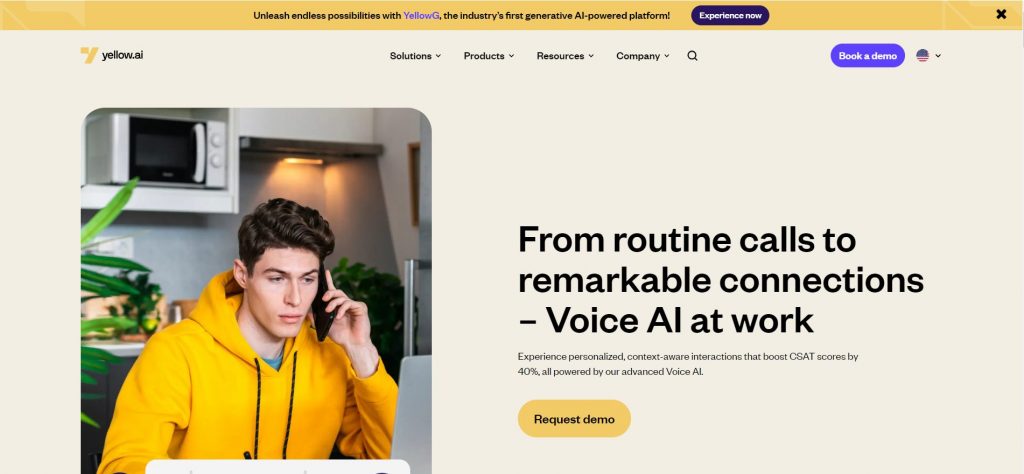
VoiceHUB, an AI-first voice automation platform streamlines customer interactions across channels and ticket lifecycles and improves customer experience. Customers expect personalized and contextually relevant interactions when they interact with voice AI agents. By accessing details of previous issues or tickets across channels, voice AI agents get enough context to have contextual conversations with customers. Deploy multilingual AI for Voice, adept at active listening, and context-switching, to handle customer interruptions with context and empathy.
Pricing:
Average cost per year: $1,500 and the other plan is enterprise which you can contact for pricing.
3. Cognigy Voice AI
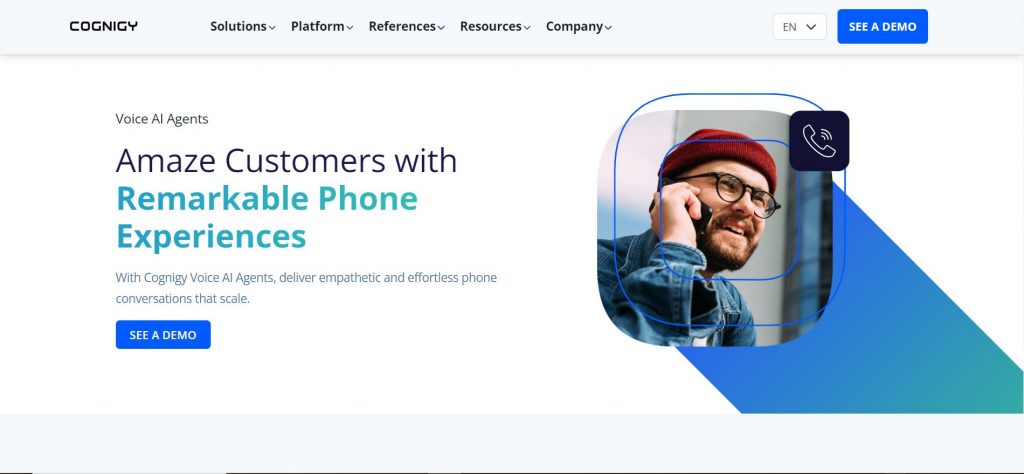
Cognigy’s Voice AI Agents bring conversational and routing intelligence to your contact center to create smoother customer journeys, elevate engagement, and increase first-call resolution. Our Voice AI Agents can speak over 100 languages fluently and empower your support team with real-time translation, helping your business deliver global service and grow. Elevate CX and fast-track resolution by tapping into multimodal interactions. Allow customers to easily capture photos, share locations, execute payments, submit signatures and more.
Pricing:
Starting from: $2500.00/month
Pricing model: Subscription
Free Trial: Available
4. Nuance Voice AI
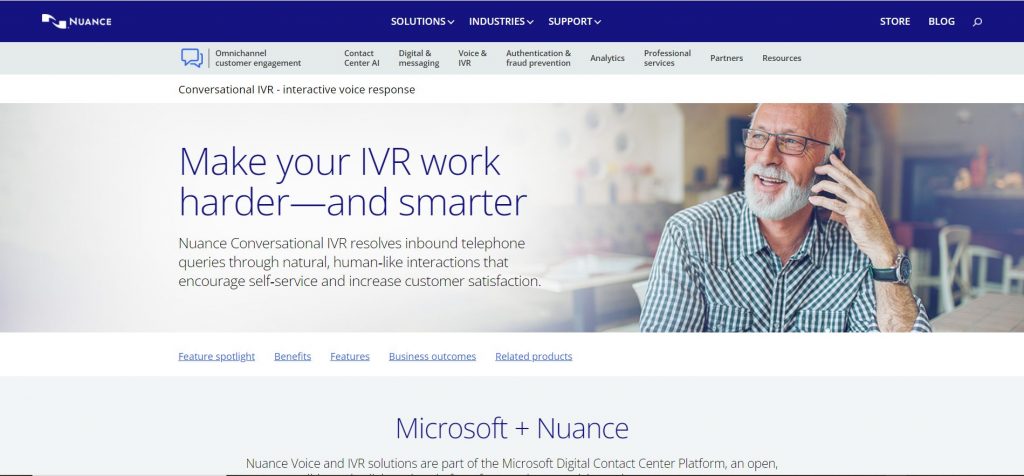
Nuance Nina is an intelligent virtual assistant solution that combines voice recognition and NLP to deliver personalized customer support. Nina can handle a variety of customer interactions, from answering FAQs to processing transactions. It also supports seamless integration with human agents for complex queries. Companies like ING Bank use Nuance Nina to offer voice-activated banking services, enhancing customer experience and operational efficiency. Flexibly deploy Nuance Conversational IVR on any third‑party cloud, in the Nuance cloud, on‑premises, or in a hybrid environment to deliver conversational self‑service experiences that automate inbound call resolution.
Pricing:
Please visit Nuance and contact for pricing
5. Deepgram Voice AI
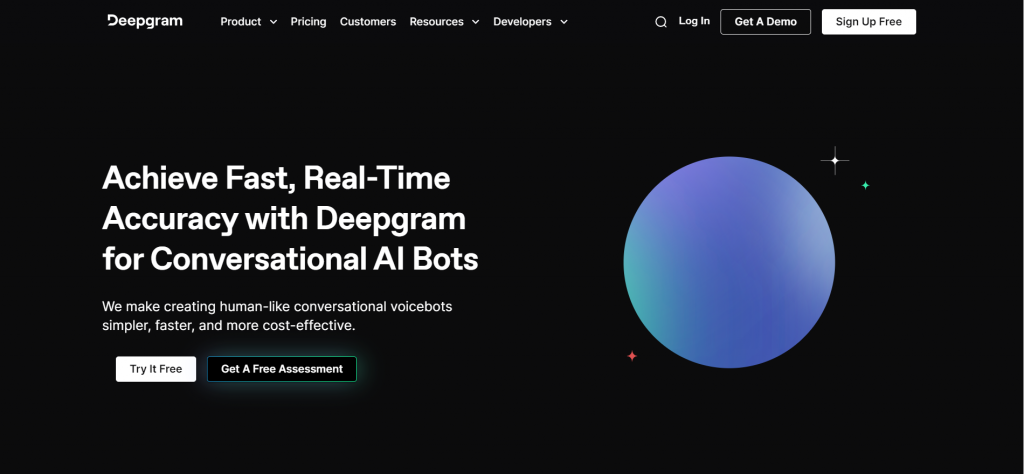
Deepgram’s voice AI Dialects and accents? Crosstalk? Jargon and slang? The speech recognition API that powers a voicebot has to be accurate and fast so the digital agent can respond to the caller in real time. With Deepgram, our speech models correctly identify unique keywords and phrases such as product names, acronyms, accents, and more. It automatically identifies and transcribes the dominant language in your audio to enhance the overall customer experience. Deepgram makes creating human-like conversational voicebots simpler, faster, and cheaper. So you’ll never have to hear “Can you repeat that?” ever again.
Pricing:
Pay As You Go: Free
Growth: $4k to $10k per year
Enterprise: Contact to know the prices
6. Floatbot Voice AI
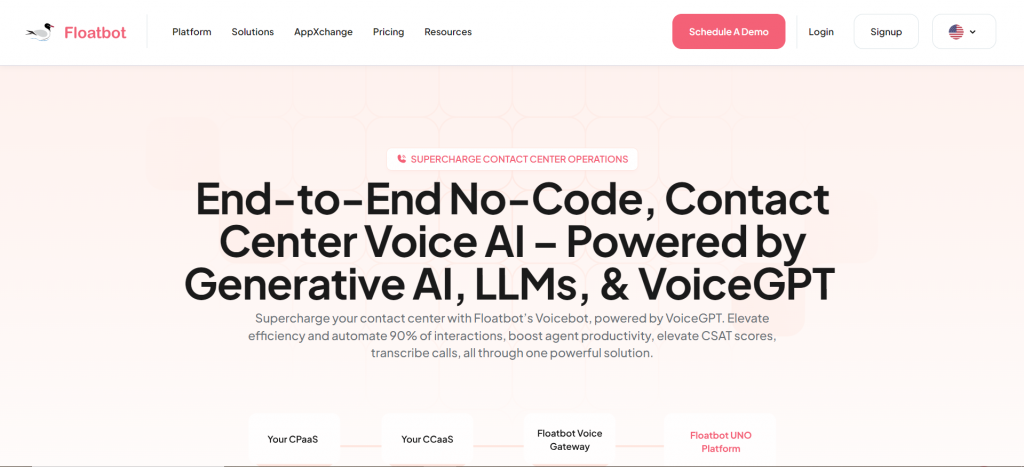
Floatbot provides a no-code, SaaS-based Voice AI platform that helps you build and deploy AI-powered voicebots and Chatbots without coding. We also provide deep-tech ASR and Voice Biometrics solutions. Breakthrough LLM model powered by 100% generative AI, architected for low-latency, enterprise-grade stability, that allows fine-tuning with your conversational data, knowledge base, and documents.
Pricing:
It has custom-based pricing models, please visit their pricing page.
Conclusion: Finding the Right Balance
Voice AI agents and human agents each bring unique strengths to the table in customer support. While voice AI agents offer advantages such as 24/7 availability, cost efficiency, and consistent responses, human agents excel in empathy, complex problem-solving, and building customer relationships. The key to delivering exceptional customer support lies in finding the right balance between the two.
A hybrid approach that combines the capabilities of voice AI agents with the strengths of human agents can optimize the customer support experience. By defining clear roles, ensuring seamless handovers, leveraging data and analytics, and focusing on personalization, businesses can harness the power of both AI and human agents to provide timely, relevant, and empathetic support.
Ultimately, the goal is to create a customer support system that is not only efficient and scalable but also capable of meeting the diverse needs and expectations of customers. As technology continues to evolve, the integration of voice AI agents and human agents will play an increasingly important role in shaping the future of customer support. By embracing this balanced approach, businesses can ensure they deliver the high-quality support that customers demand and deserve.
Are You Ready To SkyRocket Your Business With Our Voice AI agents
Click The Button Below And Gather Quality Leads With Cold Calling

